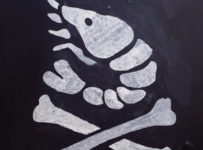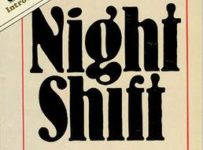
I've finally done it. I've run out of unread Discworld books. No more Discworlds until the next one. This used to be the case with me all the time from 1998 to 2006, but the flavour of "no more Discworld for now†is different in 2011.
I Shall Wear Midnight is not the final Discworld book, and nor should it be read as such. It is possibly not even the final Tiffany Aching book, but it certainly brings this part of her story to a close.
A lot of people don't like Pratchett's "Discworld books for Younger Readersâ€, because they don't consider themselves "younger readersâ€. As it is a long established fact that the only people who read Discworld books are eleven year olds named Kevin ("I am an eleven year old named Kevin and so is my wifeâ€), these people need to stop cutting off their noses to spite their faces.
Something primal has awakened in the people of the Disc, and they have turned against witches. Tiffany Aching, now on the cusp of sixteen, must stand up to the ancient Cunning Man while also battling the prejudices and fear bubbling in the common man.
Wee Free Men is not among my favourite Discworld books, but its three follow ups are. The thing is that without nine year old Tiffany Aching, every other incarnation of Tiffany Aching simply could not exist. A Hat Full of Sky, Wintersmith and I Shall Wear Midnight are as much "witches†books as anything explicitly starring Granny Weatherwax, Nanny Ogg and Magrat. They are on the whole more didactic than the earlier books, true, but this doesn't stop them from being valuable works – and legitimate entries in the canon of the witches. If you want an understanding of the way witches of the Disc work, and to attain new perspectives on Granny Weatherwax and Nanny Ogg, skipping these books is not an option.
The Nac Mac Feegles are where they belong, which is on the periphery. These books are not about the Wee Free Men, they're about a young girl discovering her place in the world and finding that being pedantic is not the same thing as knowing everything.
As the series has progressed, Tiffany has learned more about human nature and has grown into her role as a young, responsible and respectable witch. More than a practical young girl with a frying pan – the stuff of stories – she is now her own person, and one who could carry any other book at that. Tiffany Aching has grown into one of Pratchett's most nuanced and real characters, less of an archetype and more of an unprecedented literary heroine. She is possibly his most empathetic creation, and definitely much more compelling than the likes of Moist von Lipwig (which is, of course, another matter entirely).
Where we do get the Nac Mac Feegles, though, it's clear that Pratchett has significantly tweaked their usage since The Wee Free Men, where they were the slightest bit annoying (as I said, it's not my favourite Discworld novel; I didn't much like it at all until about the third or fourth go around). Rob Anybody, as head of the clan and married to the Kelda, now has more to fight for than he ever had before. Rather than being little figurines, Pratchett has invested in each of the major Feegle a definite sense of purpose. They are now a joy to read rather than a burden to endure, and this is likely almost the same way that Tiffany has grown to think of them. That Jeannie, the clan's matriarch, has become more than a simple jealous wife but rather Tiffany's equal-or-better, is cause for celebration.
Interesting also is the representation of Tiffany's parents. It's likely that they haven't changed much as people since Wee Free Men, but rather that Tiffany's perception of them and reception by them has. As she's grown older, Tiffany has come to see how everyone fits into the chalk, and this includes her parents' place in the society. More than unfair figures who never paid her enough attention, they have become actual people. They're not just her mother and father: they're a man and a woman. The subtle gradations that have brought them to this point have culminated in a particularly satisfactory if easy to miss arc.
Taken as a set of four books, one can also trace the arc of Roland from stupid and spoiled to reluctant nobleman. Pratchett defies expectations with his treatment of most of the noble characters, particularly the Baron himself. A shadowy figure defined only by his ability to be put in place by Granny Aching in Wee Free Men and scarcely considered save for illness in Wintersmith, he becomes a catalyst and sentimentalist here. From very early in the book, Pratchett strikes precisely the right emotional chord and caught me entirely off guard. It would be foolish to list all of the delights in this book and why they're delightful, because I would be basically reproducing the entire text here and would get in trouble with Doubleday.
Some may take issue with the character of Preston, who may well seem too convenient and good to be true, but if you look at him as
- the diametric opposite of Sean Ogg; and
- a character who has no reason not to exist
there is no reason not to accept him. The way that he plays out is natural and unhurried, and Discworld characters have been forged from weaker foundations. I'm naturally biased but I think that most issues taken with I Shall Wear Midnight are generally too petty to bother with.
The culture of fear that the Cunning Man represents seems particularly apt for the ridiculous society that we now find ourselves in, and Tiffany Aching is eminently relatable to anyone, regardless of their own personal experiences of being a teenaged girl. Themes of belonging in society, boffo and – joy of joys – time travel make this a strong narrative in addition to an excellent character study. Pratchett is in top form; where Making Money and Going Postal teetered on the edge of broad farce, I Shall Wear Midnight comes down firmly on the side of incredibly humanistic storytelling – and is legitimately one of his best novels to date as a result.
One complaint I've seen levelled against this book is that Pratchett has written it as if it were his last (no, he hasn't), and that there are therefore too many cameos from series favourites. This is resolutely untrue, as every character in the book serves a purpose. You can't complain about the Watch showing up on the streets of Ankh-Morpork when there are Feegles afoot. If they had arrived in the big city with absolutely no repercussions, that would be more unrealistic than Carrot showing up to deal with them. That this leads to thematic expansions and obvious if unexpected character development means that Pratchett has actually served the book rather than made it take a pointless detour. If you complain about the interconnectedness of Discworld characters, the blurring of lines between one internal series and another, you're plainly reading them the wrong way. There is nothing gratuitous about I Shall Wear Midnight …
… Except for one thing, and it's totally worth it. Pratchett answers a question that has been hanging for 23 years, and the thing is that it makes a fairly logical sense and it deals with one of my favourite aspects of science fiction and fantasy. This particular point has been mentioned in passing by a lot of people – one of the first things that they mention about the book. I kind of wished that I hadn't known in advance, but at the same time what I was presented was totally different to what I had expected. In one of his farthest reaching callbacks, Pratchett has managed to retrospectively strengthen and reinforce a book that he wrote more than two decades ago. This is all the proof that I need of his mastery of his material.
I've long held that Pratchett really knows how to write an ending, and this is no exception. You get two endings for the price of one, with the "normal†conclusion and the epilogue. Both are heartwarming and, because I'm a horribly soft touch, I had to read the last few pages between my tears. I doubt that everyone will have the same emotional response to I Shall Wear Midnight as I did – after all, I've been reading these books more than half of my life – but it should make them feel something.
I guess the best thing about running out of Discworld is that you can start all over again. A new project commencing in 2012, I suspect. (With a detour for Snuff in October!)


